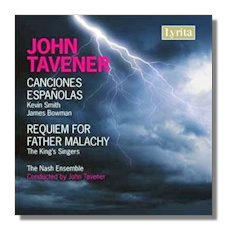
The Internet's Premier Classical Music Source
Related Links
- Tavener Reviews
- Latest Reviews
- More Reviews
-
By Composer
-
Collections
DVD & Blu-ray
Books
Concert Reviews
Articles/Interviews
Software
Audio
Search Amazon
Recommended Links
Site News
 CD Review
CD Review
John Tavener

- Canciones Españolas
- Requiem for Father Malachy
James Bowman, Kevin Smith & Alastair Thompson, tenors
Nigel Perrin & Alastair Hume, counter tenors
Tony Holt & Simon Carrington, baritones
Brain Kay, bass
The King's Singers
The Nash Ensemble/John Tavener
Lyrita SRCD.311 52m DDD
Although today John Tavener is considered as one of the most original voices in contemporary music and is celebrated for his profound and varied range of sound works, when these recordings were made (1976), he was still relatively new to the British music scene.
The two compositions on this disc both date from the early seventies and the two reveal Tavener as a composer of immense ability in translating into sound one's innermost feelings and emotions. The 1972 "Canciones Españolas" are settings or treatments of six Spanish folk songs about love and death, and although the original melodies are by Alonso de Muddura, King Alfonso X and an anonymous composer, Tavener treats the material in a very straightforward way, making it much more accessible than in his previous "Ultimos Ritos" where ancient Spanish music was transformed into a distant form which was almost unrecognizable.
Requiem for Father Malachy was written in memory of Father Malachy Lynch, a Carmelite renowned for his deep spirituality and pragmatic scholarship. Although the composer and the prelate met infrequently, the latter left a lasting impression on Tavener who was inspired to write this piece following a huge thunderstorm during Father Malachy's funeral on 10th May 1972.
Written in 1953 and revised six years later, the work has a deeply personal tone, and the intimate quality of the scoring adds to the uses of Latin singular which raise it to a high level of eloquence despite its dissonance. The composer marshals his forces to great effect and these première recordings are permeated with a natural intensity that never allows one to relax. A hugely important document from the early years before Tavener's eventual development to stardom.
Copyright © 2009, Gerald Fenech




















